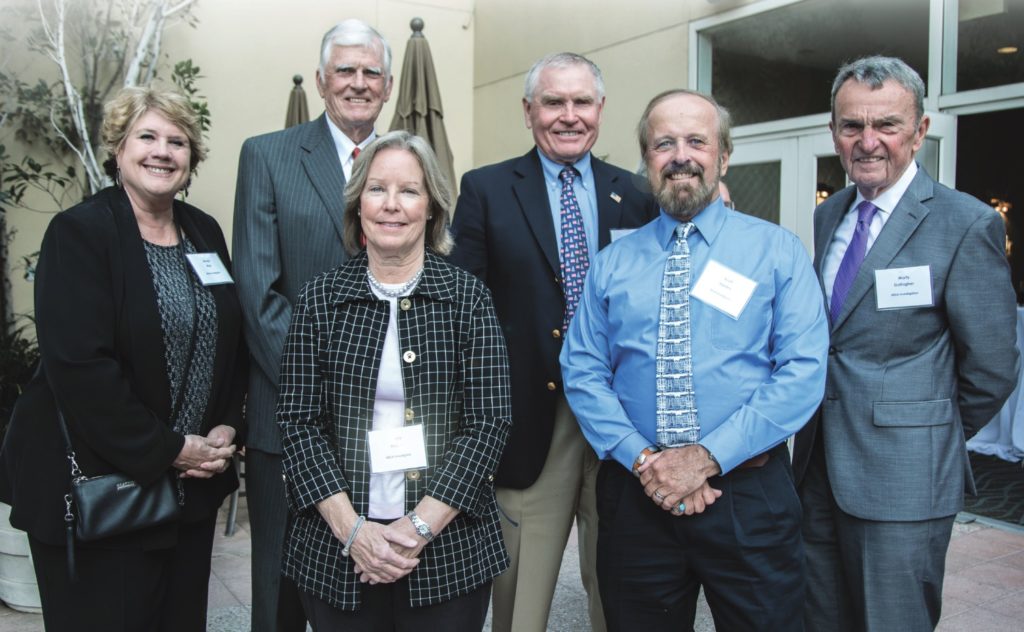For 25 years, Marty Gallagher tracked down kidnappers, investigated government fraud and foreign counterintelligence, and in one case even helped send a young military contractor to prison for espionage.
After retiring from his post as a Los Angeles-based FBI agent in 1988, he spent time in the private sector, overseeing the ethics program for Hughes Aircraft Corp.’s legal department and consulting for LA’s public schools.
Then, in the 2000s, he discovered a new calling that asked for his talents and experience: helping the Catholic Church investigate allegations of clerical sexual abuse, part of a crisis that was then shaking the institution to its core.
Until retiring last year, Gallagher was for more than a decade an investigator for the Archdiocese of Los Angeles, part of comprehensive abuse protection efforts that include mandatory fingerprinting, background checks, and safe environment training for all employees and volunteers in church and school settings.
Working in collaboration with the archdiocese’s general counsel, the former agents investigate claims and present their findings to the archdiocesan panel charged with advising Archbishop José H. Gomez.
“It was a good choice,” said Gallagher, a parishioner at St. James Church in Redondo Beach, of the decision to bring in former FBI agents. Allegations of abuse against priests require “objective, accurate, mature, skilled investigators who know how to communicate,” especially with witnesses and victim-survivors of abuse, he explained.
His work for the Catholic Church preceded his time in LA. It began when retired FBI executive Kathleen McChesney recruited him to be a “canonical auditor” for the U.S. Conference of Catholic Bishops.
In the wake of highly publicized abuse scandals in Boston and other parts of the country, the nation’s bishops in 2002 adopted a set of abuse-prevention protocols requiring that dioceses establish review boards to investigate allegations against priests.
Gallagher began by serving on the “Gavin group,” an independent firm brought in by the U.S. bishops to audit every U.S. diocese as a result of the protocols.
“It was interesting to see how [diocesan] review boards were structured, the number of people used and how they functioned, and what advice we could give them,” said Gallagher, who spent eight years on that task force, conducting audits at more than 40 dioceses across the country.
In 2011, Gallagher took the call from the Los Angeles Archdiocese. Since the 1990s, the archdiocese had maintained an advisory board, made up of laypeople and priests, that evaluated reports of suspected impropriety by priests or deacons and made recommendations to the archbishop. He had already audited the archdiocese twice while serving on the Gavin group, and saw the progress firsthand.
“I saw the growth in the [archdiocese’s] whole program: training, education, law enforcement referrals,” said Gallagher, now 85.
Jacqui Ruiz, another investigator who retired from the FBI in 2007, was raised in a Catholic family, attending St. Paul of the Cross School in La Mirada as a child. She worked for more than a decade investigating cases for the archdiocese, beginning in 2009.
“I believe it’s probably safer today to have a child in the Catholic schools or doing Catholic activities than anywhere else at this point, especially in Los Angeles, because it has had a very robust system in place for so long,” she told Angelus.
In her work for the FBI, Ruiz dealt with traumatized victims of bank robberies, but also with criminal suspects who had been traumatized by sexual abuse in their youth.
“It’s always about finding the truth — which was right up my alley — and you are way better off if you can take an emphatic approach, which is my natural inclination,” said Ruiz, who has an advanced degree in counseling. “It’s gaining trust, which leads to gaining information. This is all about being a straight shooter and getting to the gritty details to get to the facts.”
The ex-FBI agents coordinate with the general counsel’s office, the archdiocese’s clergy office, and its Victim Assistance Ministry office.
In 2003, general counsel Margaret Graf recruited Eusebio “Sonny” Benavidez, retired from the FBI four years earlier, to join the investigators — particularly for his skills as a Spanish interpreter.
The work, he quickly discovered, was not so different from that of his FBI days.
“The process for me was the same: Do the in-depth interviews and document the results. They just wanted me to find the truth,” said Benavidez, who retired from the role in 2011.
“You never start with a preconceived idea when someone makes an allegation,” he added. “You have to start from a neutral point and see which way it takes you. If you have a preconceived idea and drive any evidence that way, that will always mess up an investigation.”
He said his mandate from the archdiocese was clear from the beginning: “Whether it is good or bad, we have to deal with it. Just bring us what you find.”
Benavidez said he benefited from having grown up in a family that was active in the Church. Helping as an altar server during his teenage years “helped me understand the environment. If you understand the scene, you know where to look for evidence.”
The work of investigators like former agents Gallagher, Ruiz, and Benavidez is one of the quieter parts of a broader, sustained commitment to child protection by the archdiocese, where “credible cases of misconduct have become rare” over the last two decades, Archbishop Gomez said in a recent message to the archdiocese.
Since 2003, the archdiocese has maintained a rotating group of six ex-FBI investigators working at a time. Looking back, Gallagher said they all “represented a great cross section of really good agents.”
“When you work for the FBI, from my frame of reference, you are doing something noble, for a good purpose, for the good of the country,” said Gallagher. “When you retire, you can continue doing good work for others.”

